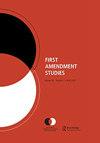Contesting the place of protest in migrant caravans
Q2 Social Sciences
引用次数: 1
Abstract
ABSTRACT Restrictions on assembly, all of which disproportionately target Black, Indigenous, and People of Color, demonstrate that the freedom to assemble depends on state-defined temporal, behavioral, and spatial boundaries of political practice. This essay analyzes how the migrant caravans organized by Pueblo Sin Fronteras (PSF) push against the state-derived boundaries on assembly. Specifically, it focuses on two tactics deployed by the caravans: (1) using the term caravan and caravana to describe border crossing, and (2) media practices that turned undocumented border crossing into border refusal. These tactics contested the nation-state sovereignty required to mark its jurisdiction, and thus, to decide on the correct place and form of politics. In the end, the essay argues that the caravan expanded what it means to freely assemble by turning undocumented migration into protest. Communication scholars should pay attention to this expansion because it illuminates alternate ways of being political that push against the legacy of nation-state sovereignty and colonization.在移民大篷车中争夺抗议地点
摘要对集会的限制,所有这些都不成比例地针对黑人、原住民和有色人种,表明集会自由取决于国家定义的政治实践的时间、行为和空间边界。本文分析了Pueblo Sin Fronteras(PSF)组织的移民商队是如何在集会上突破国家边界的。具体而言,它侧重于大篷车部署的两种策略:(1)使用大篷车和大篷车一词来描述越境,以及(2)将无证越境变成拒绝越境的媒体做法。这些策略对民族国家主权提出了质疑,民族国家主权是标记其管辖权所必需的,从而决定了正确的政治位置和形式。最后,文章认为,商队通过将无证移民转变为抗议,扩大了自由集会的意义。传播学学者应该关注这一扩展,因为它阐明了反对民族国家主权和殖民化遗产的政治方式。
本文章由计算机程序翻译,如有差异,请以英文原文为准。
求助全文
约1分钟内获得全文
求助全文
来源期刊

First Amendment Studies
Social Sciences-Law
自引率
0.00%
发文量
0
期刊介绍:
First Amendment Studies publishes original scholarship on all aspects of free speech and embraces the full range of critical, historical, empirical, and descriptive methodologies. First Amendment Studies welcomes scholarship addressing areas including but not limited to: • doctrinal analysis of international and national free speech law and legislation • rhetorical analysis of cases and judicial rhetoric • theoretical and cultural issues related to free speech • the role of free speech in a wide variety of contexts (e.g., organizations, popular culture, traditional and new media).
 求助内容:
求助内容: 应助结果提醒方式:
应助结果提醒方式:


